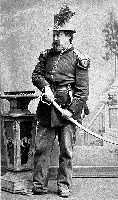Emperor Norton

By far the best known of all San Francisco's strange characters was the Emperor Norton, whose real name was Joshua A. Norton. He was born in England in 1819 and at the age of thirty came to San Francisco with forty thousand dollars, with which he established himself as a real estate operator and broker. Within ten years he had increased his fortune to two hundred fifty thousand dollars, all of which he lost in an unlucky investment.
The financial disaster rebalanced his mind, and on September 17, 1859 he sent to the newspapers an anouncement that the California Legislature had chosen him Emperor of the United States, and that henceforth he must be addressed by his proper title. For a while he also styled himself Protector of All Mexico.
For nearly thirty years he was one of the best known men in San Francisco, and under his rule there came a renaissance of freedom and civility seldom seen in the world. Each afternoon he promenaded the downtown streets, graciously greeting his subjects and arbitrating minor disputes. His decisions were universally considered wise and just, and he was often compared to Solomon.
Emperor Norton wore a blue military uniform with tarnished gold-plated epaulets, which had been given him by the officers at the Presidio United States Army post, and a beaver hat decorated with a peacock feather and a rosette, and he always carried both a cane and an umbrella.
|
When his uniform began to look shabby, the Board of Supervisors, with a great deal of ceremony, appropriated enough money to buy him another, for which the Emperor sent them a gracious note of thanks and a patent of nobility in perpetuity for each Supervisor.
But Emperor Norton was also apt to bequeath nobility on complete strangers who had never done anything for him, people he talked with, people who seemed to be having a bad day. The length of nobility ranged from a day (whence the phrase "queen for a day") to perpetuity. Although none of his nobles had the full range of privileges of Emperor Norton, for many who had fallen on hard times it was what they needed to get going again.
He ate without paying at whatever restaurant, lunchroom, or saloon took his fancy; after he visited an establishment, the owners were permitted to post a sign: "By Appointment to His Emperor, Joshua Norton I." Invariably, these "appointments" brought great business to the saloon or restaurant so graced.
To raise funds, he issued and sold to his subjects bonds in the denomination of fifty cents. His occasional checks for that amount were invariably honored by the San Francisco bankers and merchants. On January 8, 1880, the Emperor died. His funeral was a grand procession of thousands, followed by a rousing party that lasted for days.
Joshua Norton, First Emperor of the United States and Protector of All Mexico, left an estate comprising a two-and-a-half dollar gold piece, three dollars in silver, a franc piece of 1828, and 1,098,235 shares of stock in a worthless gold mine.
Cronology I
-
Cronology II
Back
|








